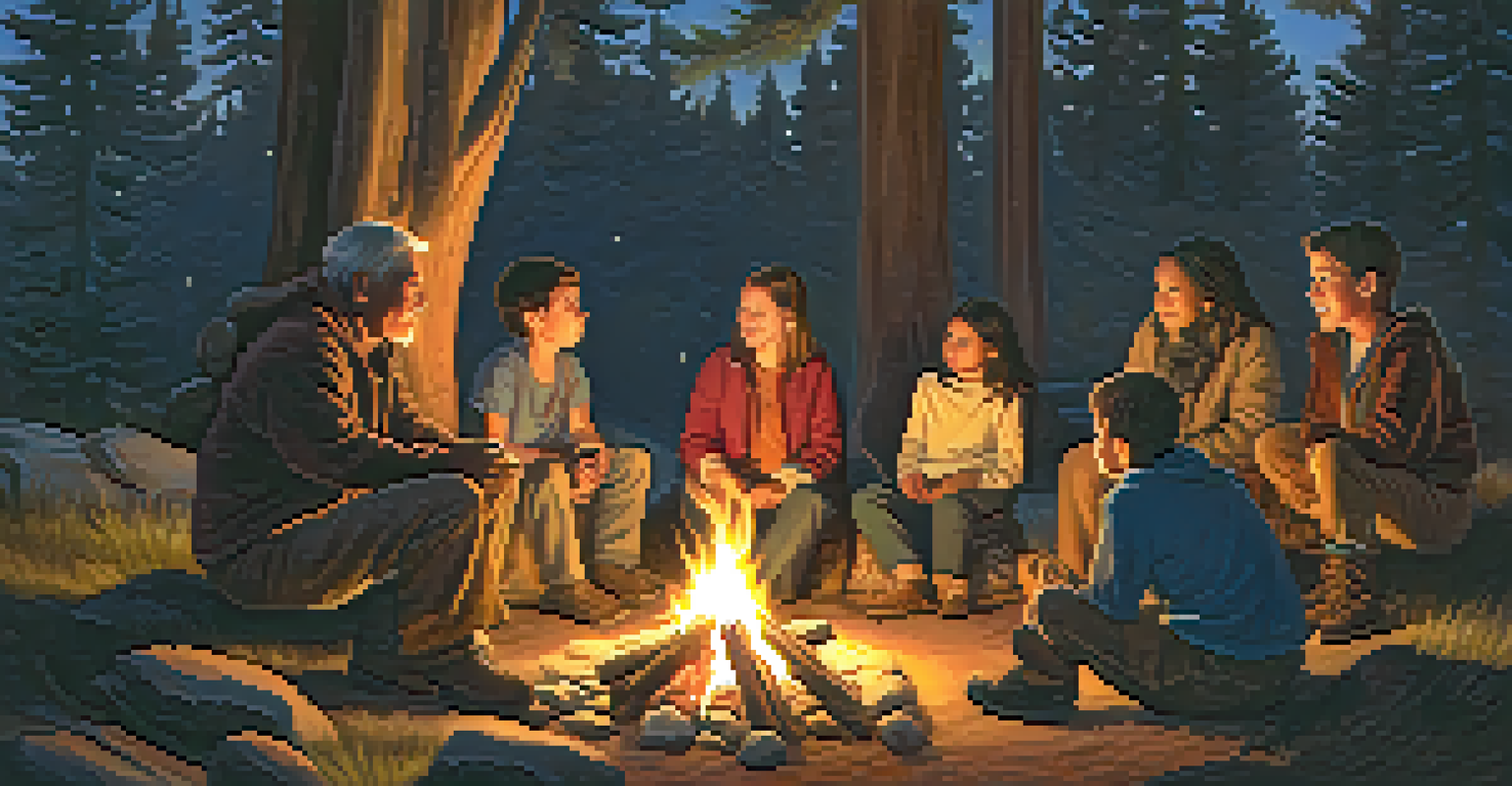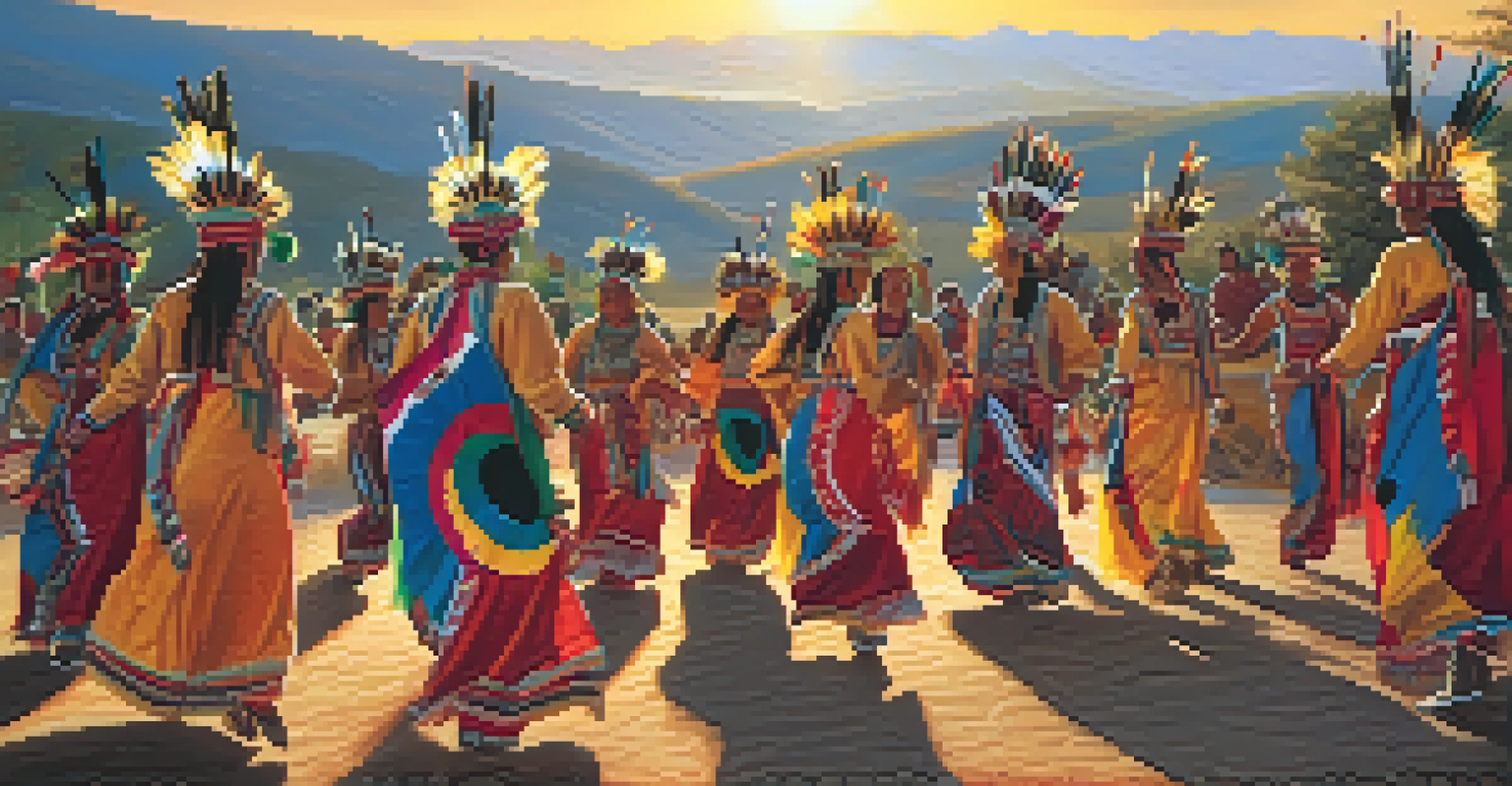Indigenous Beliefs: Reality Through a Cultural Lens

Understanding Indigenous Beliefs and Their Importance
Indigenous beliefs are systems of understanding that shape the worldview of many native cultures. These beliefs often encompass spirituality, community values, and a profound connection to nature. They serve not just as religious practices but as guiding principles that influence daily life and interpersonal relationships.
We do not inherit the earth from our ancestors, we borrow it from our children.
At the heart of these beliefs is the idea that everything is interconnected. For instance, many Indigenous cultures view the land, animals, and plants as relatives rather than resources. This perspective fosters a deep sense of responsibility for the environment, urging communities to live sustainably and honor their ancestors.
Recognizing the significance of Indigenous beliefs is essential in appreciating cultural diversity. These beliefs provide a unique lens through which to view reality, offering insights that can enrich our own understanding of community, spirituality, and the natural world.
The Role of Storytelling in Indigenous Cultures
Storytelling is a vital tradition among Indigenous peoples, acting as a vehicle for passing down knowledge and beliefs. Through stories, elders share wisdom and teachings that reinforce cultural identity and values. These narratives often include creation myths, moral lessons, and historical accounts that connect the past with the present.

For example, many Native American tribes have creation stories that explain the origins of the Earth and its inhabitants. These tales not only entertain but also impart important lessons about respect for nature and the balance of life. They serve as reminders of the responsibilities each person has toward their community and environment.
Indigenous Beliefs Emphasize Connection
Indigenous beliefs highlight the interconnectedness of all life, fostering a deep respect for nature and community.
Moreover, storytelling fosters a sense of belonging and continuity within Indigenous communities. By sharing these stories, individuals reinforce their cultural ties and ensure that the teachings of their ancestors remain alive for future generations.
Spirituality in Indigenous Belief Systems
Spirituality plays a central role in Indigenous belief systems, often interwoven with daily life and rituals. Many Indigenous cultures see the spiritual realm as intimately connected to the physical world, where every element has a spirit and purpose. This belief leads to practices that honor these spirits and seek harmony within the universe.
Storytelling is the most powerful way to put ideas into the world today.
For instance, many Indigenous groups conduct ceremonies that celebrate seasonal changes, agricultural cycles, or important life events. These rituals often involve music, dance, and offerings, creating a powerful sense of community and connection to the earth. They serve as reminders of the sacredness of life and the importance of maintaining balance.
Through these spiritual practices, Indigenous peoples not only express their beliefs but also cultivate a deeper relationship with nature. This relationship emphasizes respect, gratitude, and a sense of stewardship, allowing them to live in alignment with their cultural values.
Connection to Nature in Indigenous Beliefs
A defining feature of Indigenous beliefs is the deep connection to nature that many cultures uphold. This bond is not merely physical but spiritual, as the land is often regarded as a living entity that holds sacred significance. Such beliefs encourage a respectful and reciprocal relationship with the environment.
For example, in many Indigenous cultures, land is viewed as a source of identity and sustenance. Practices such as hunting, fishing, and gathering are not just means of survival; they are rituals that honor the earth. This perspective fosters a sense of gratitude and responsibility toward nature, emphasizing the importance of conservation and sustainability.
Storytelling Preserves Cultural Identity
Storytelling serves as a vital tradition that transmits knowledge and reinforces cultural values across generations.
Understanding this connection invites us to reconsider our own relationship with the environment. By recognizing the value of living in harmony with nature, we can learn from Indigenous practices that promote ecological balance and respect for all living beings.
The Impact of Colonization on Indigenous Beliefs
Colonization has had profound effects on Indigenous beliefs, often leading to a loss of cultural practices and spiritual connections. Many Indigenous communities faced forced assimilation, which aimed to erase their languages, traditions, and worldviews. This disruption has caused lasting trauma and a struggle to preserve cultural identity.
Despite these challenges, many Indigenous peoples have shown resilience in reclaiming and revitalizing their beliefs. Efforts to preserve languages, revive traditional ceremonies, and educate younger generations are crucial for maintaining cultural heritage. These initiatives not only honor the past but also empower communities to assert their identity in the present.
The ongoing journey of healing and restoration highlights the importance of supporting Indigenous voices and rights. By acknowledging the impact of colonization, we can better appreciate the resilience of Indigenous cultures and work toward a more inclusive understanding of history.
Indigenous Knowledge and Modern Science
Indigenous knowledge systems offer valuable insights that can complement modern scientific understanding. Many Indigenous communities possess a wealth of ecological knowledge acquired over generations, which can inform sustainable practices. This knowledge is often rooted in a holistic view of ecosystems, emphasizing the interconnectedness of all life forms.
For instance, Indigenous farming practices, such as companion planting and crop rotation, have demonstrated remarkable success in maintaining soil health and biodiversity. By integrating these practices with modern agriculture, we can develop more sustainable food systems that benefit both people and the planet. This collaboration highlights the importance of respecting and valuing diverse knowledge systems.
Resilience Amidst Colonization Challenges
Despite the impacts of colonization, Indigenous communities are actively reclaiming and revitalizing their beliefs and practices.
Moreover, Indigenous perspectives can enrich scientific research by providing context and cultural significance to environmental issues. Working alongside Indigenous communities fosters mutual respect and creates opportunities for innovative solutions to global challenges such as climate change and biodiversity loss.
Preserving Indigenous Beliefs for Future Generations
The preservation of Indigenous beliefs is vital for cultural continuity and the well-being of future generations. This involves not only maintaining traditional practices but also adapting them to contemporary contexts. By fostering an environment of cultural pride, younger generations can feel empowered to embrace their heritage.
Communities often engage in educational programs, workshops, and cultural events to share their beliefs and practices. These initiatives create spaces for dialogue, learning, and celebration, allowing individuals to connect with their roots. They also encourage respect and understanding among diverse cultures, fostering a sense of unity.

Ultimately, preserving Indigenous beliefs is a shared responsibility. By supporting Indigenous communities and advocating for their rights, we contribute to a more equitable and just society that honors the richness of cultural diversity.